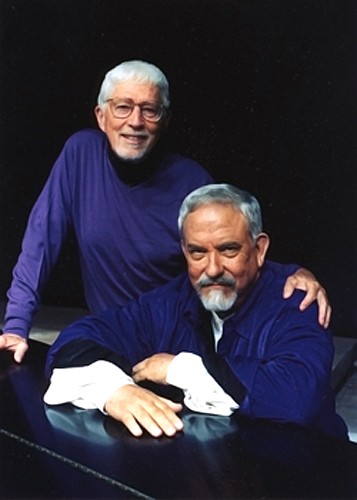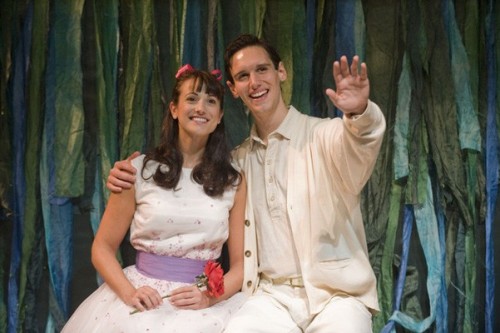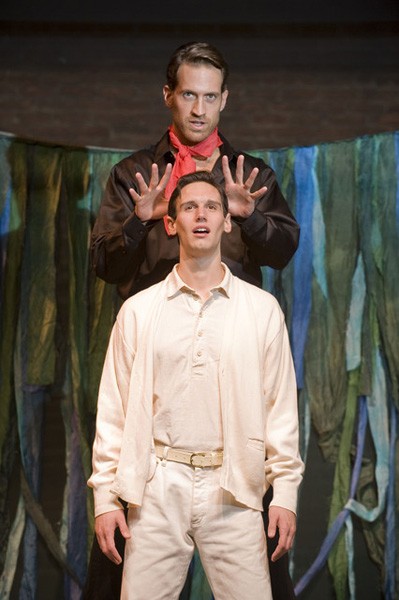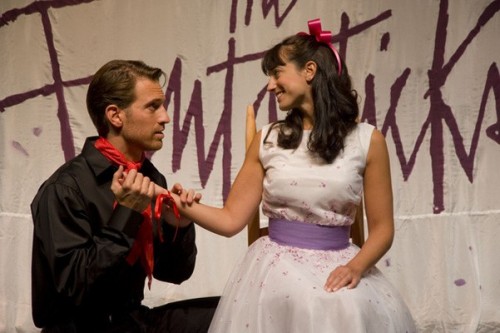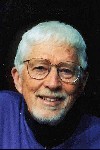The Fantasticks, the Methuselah of Musicals at Barrington Stage Company
BFA Interviews its Creator, Tom Jones
By: Larry Murray - Oct 05, 2009
Hard to believe, but The Fantasticks has been around so long that "its assistant stage manager was once a young kid named David Mamet," according to Tom Jones, its co-creator with Harvey Schmidt. It opens this week at Barrington Stage Company in Pittsfield for a two week run.
"Mamet cut the paper squares and ironed the shirts, and he wrote an article years later: "I was a gopher at The Fantasticks," recalled Jones in a phone interview.
Originally staged at Barnard College The Fantasticks received its official premiere at the Sullivan Street Playhouse on May 3, 1960. Its original run closed on January 13, 2002 after 17,162 performances. But even that didn't stop the phenomenon. Since that time, it has played in over 5000 American cities and 80 foreign countries, and has been revived off Broadway, most recently at the Snapple Theatre, recently renamed for Jerry Orbach.
Tom Jones who wrote the book and lyrics, and Harvey Schmidt the music, first began collaborating while students at the University of Texas. Other Schmidt/Jones collaborations include 110 In The Shade, I Do, I Do, and the original ritual musical Celebration.
The fresh new Berkshire production is directed by Andrew Volkoff, who also talked with us about his preparations for the show. His interview will appear later. We start at the beginning with Tom Jones who wrote the book and lyrics and conceptualized the show.
Like so many in show business, he started at the bottom.
"I was 32 when The Fantasticks opened and I waited a lot of tables before that, though I was lucky and mostly worked at bookstores. Entering the kitchens of a busy eatery is like hell on earth. I loved Arnold Wesker's play The Kitchen in which one act takes place in the elegant dining room while the other happens in the cauldron of the kitchen. Waiters get to shuttle between the two worlds."
Jones and Schmidt went to school together, and worked together for many decades, and I wondered if they still saw each other.
"Harvey moved back to Texas not long ago to be with his family. And without him around, there's a void. You know, before Richard Rogers and Oscar Hammerstein starting collaborating, they each had written 25 shows, and that experience is invaluable. Today we are lucky to have a dozen musicals a year on all of Broadway."
It's an increasingly tough business to get experience in, and live theater thrives when talented musical writers come along. We talked a bit about the Musical Lab at Barrington Stage under Bill Finn which attempts to nurture promising composers and lyricists and give them some exposure.
The long run of The Fantasticks was a theater lab of a different type, giving actors a chance to gain experience performing in live theater.
Jerry Orbach (Murder She Wrote, Law and Order) was in it. He made $70 a week. So was F. Murray Abraham (Amadeus) in the 1960's. And that's just the original off-Broadway production.
Jones and Schmidt were not one hit wonders, they also wrote I Do I Do, and my personal favorite, 110 in the Shade, a full Broadway musical that had a pre-Broadway tryout in Boston. "And we made lots of changes, too," remembered Jones. "There was one song - "A Man and A Woman" that we wrote in one day, and put it in the show. It was so new that Stephen Douglas didn't have a chance to learn it. He came downstage to the lip of the orchestra pit to sing it, and they had an assistant stage manager with huge cue cards offstage. She would drop them as the song progressed, just like in the early days of television, to make sure he didn't drop a line."
Getting back to the original production of The Fantasticks, it was a surprise to learn he played the "old actor" in it back then, and in the recent New York revival he did the same thing again. We wondered how long he could keep it up.
"In the 2006 revival I did play it for eighteen months, and on my final night there was a little celebration. I told them that if I was to continue, I would no longer get out of the box, the audience would have to walk by and I would say my lines."
With the long original run, were you in it to keep an eye on things, and after you left, how often did you check in?
"Harvey and I never expected the show to run as long as it did, and after it opened, we went on to other things. At first we helped with the casting of replacements, and giving notes, and did this very thoroughly for the first ten years. We did less of that in the second decade, and even less in the third. By the fourth decade, I am sorry to say, we let it get sort of run down by the time it closed.
"It taught me a lesson. I went to the closing night and was shocked at what I saw. I felt so guilty, this piece had been so wonderful to us, and I loved it a lot, but it had become a different show. The actors were taking liberties, playing it for laughs and not simply trusting the words. You have to trust the piece, not murder it."
Continuing his story about David Mamet, Jones says "In that article he wrote, he talks about us sitting way off stage where we could see the actors and talk but not be heard. He insists I would sit with my head in my hands, wondering out loud - why don't they just say their lines. And that is the way I felt by the time it ended its long first run.
"The thing you want to do with acting is just to make the people seem real. It's all you have to do. There's a famous Spencer Tracy line where someone asks what he does. 'I'm an actor,' he replies. Pause. 'Well, fine, just don't let anyone catch you at it.' And that is the way I feel about the craft."
Mamet was a teenager when the playwright and Jones first met, and went on to write the Pulitzer Prize winning Glengarry Glen Ross and the Oscar nominated screenplays for The Verdict and Wag the Dog. So what does Jones think of Mamet's sometimes terse, stylistic and rough language? "I really admire it. People complain about the four (and sometimes more) letter words, but I think he has enriched the language in the same way that African American writers like August Wilson take dialect and use it to enhance the power of the spoken word. The theater is just about the only place that is left where it is about language anymore, other than political campaigns."
There are similarities between The Fantasticks and that other great American classic, Our Town. Both have narrators, both are set in a simple square. "Our Town was an influence on almost everything I ever did," says Jones. "The platform's roots however was a simplificaton of a wagon I had envisioned, more influenced by Ingmar Bergman and The Seventh Seal than Thornton Wilder.
"When we came to assemble it, we wanted to make it as basic as possible, thus the elemental wooden platform, a theater trunk and a cardboard moon," remembered Jones. A little checking and we found that they spent $900 on the set and $541 on costumes at a time when major Broadway shows were costing $250,000. Recently, before the current economic dip, $10-40 million was not unusual.
Jones kept it simple.
"We based the characters on commedia dell'arte archetypes, but invested them with a contemporary emotional reality. We used verse mostly, to enhance the feeling of timelessness and a feeling of spiritual depth.
"At the end El Gallo stands in the center of the stage forming a tryptych with the boy and girl and explains why he had to hurt the young lovers:
For the audience, this is the teaching moment "where the implicit becomes explicit. Yet it passes as just another part of the show." says Jones. To many of us, it is its heart, the reason for its longevity. It speaks a universal truth, one which is timely.
The musical runs from October 7 through 18 on the BSC Mainstage, with an official opening on Saturday, October 10 at 8pm. Performance times are: Wednesday 7pm; Thursday-Saturday 8pm; Sunday 3pm. Additional performances will take place on Sunday, October 11 at 7pm, Wednesday, October 14 at 2pm and Saturday, October 17 at 4pm. Tickets are $15-35. The Fantasticks: Opening Night Saturday, October 10 at 8pm. $15 mezz/$20 orchestra tickets are available for October 7 and 8 previews. Tickets are on sale now at 413-236-8888 and www.barringtonstageco.org.

